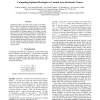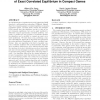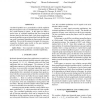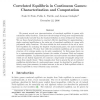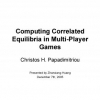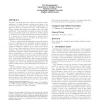148
click to vote
AAAI
2012
13 years 4 months ago
2012
Significant progress has been made recently in the following two lines of research in the intersection of AI and game theory: (1) the computation of optimal strategies to commit ...
142
click to vote
SIGECOM
2011
ACM
14 years 5 months ago
2011
ACM
In a landmark paper, Papadimitriou and Roughgarden [2008] described a polynomial-time algorithm (“Ellipsoid Against Hope”) for computing sample correlated equilibria of concis...
146
click to vote
ICASSP
2011
IEEE
14 years 5 months ago
2011
IEEE
Correlated equilibria are a generalization of Nash equilibria that permit agents to act in a correlated manner and can therefore, model learning in games. In this paper we define...
145
click to vote
CORR
2008
Springer
15 years 2 months ago
2008
Springer
We present several new characterizations of correlated equilibria in games with continuous utility functions. These have the advantage of being more computationally and analytical...
137
click to vote
CORR
2010
Springer
15 years 2 months ago
2010
Springer
We exhibit the rich structure of the set of correlated equilibria by analyzing the simplest of polynomial games: the mixed extension of matching pennies. We show that while the co...
130
click to vote
AAAI
2010
15 years 3 months ago
2010
We consider risk-sensitive generalizations of Nash and correlated equilibria in noncooperative games. We prove that, except for a class of degenerate games, unless a two-player ga...
130
click to vote
SIGECOM
2003
ACM
15 years 7 months ago
2003
ACM
We examine correlated equilibria in the recently introduced formalism of graphical games, a succinct representation for multiplayer games. We establish a natural and powerful rela...
110
click to vote
ESA
2005
Springer
15 years 7 months ago
2005
Springer
We consider the price of stability for Nash and correlated equilibria of linear congestion games. The price of stability is the optimistic price of anarchy, the ratio of the cost ...
125
Voted
STOC
2009
ACM
16 years 2 months ago
2009
ACM
The price of anarchy (POA) is a worst-case measure of the inefficiency of selfish behavior, defined as the ratio of the objective function value of a worst Nash equilibrium of a g...
